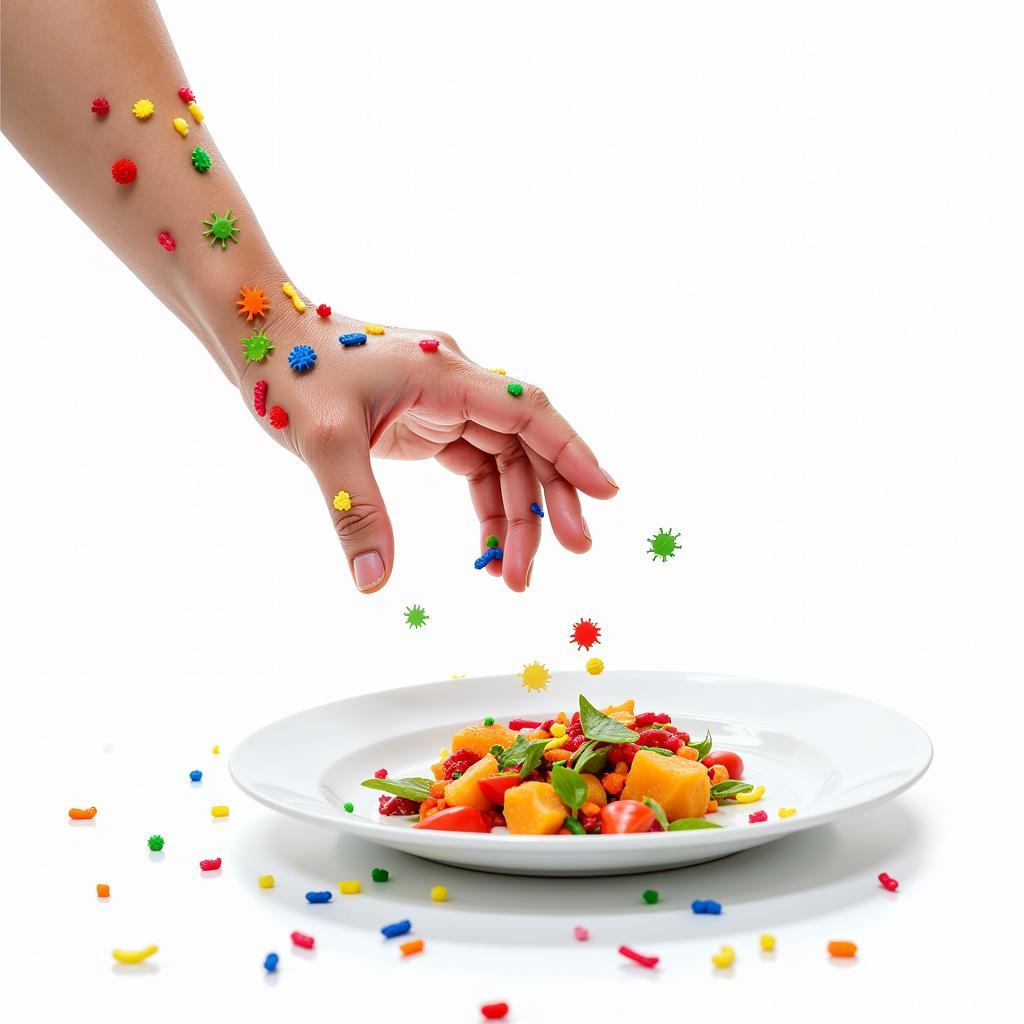Food safety is paramount, and one of the most basic rules is “don’t touch the food with bare hands.” This simple act can prevent the spread of harmful bacteria and keep your food safe to eat. We’ll explore why this is so important and offer practical alternatives.
Why You Shouldn’t Handle Food Directly
Touching food with bare hands can introduce bacteria, viruses, and parasites directly into your meal. Even seemingly clean hands can harbor millions of microorganisms invisible to the naked eye. These can cause foodborne illnesses, ranging from mild discomfort to severe sickness. Preventing contamination is a crucial step in ensuring healthy eating habits. It’s not just about personal safety; it’s about protecting others who may consume the food you prepare.
Foodborne illnesses can impact anyone, but certain populations are particularly vulnerable, including children, pregnant women, the elderly, and individuals with weakened immune systems. For these individuals, the consequences of foodborne illness can be particularly severe.
 Germs on Hands and Food Contamination
Germs on Hands and Food Contamination
Safe Food Handling Practices: Alternatives to Bare Hands
Fortunately, there are several simple and effective alternatives to handling food with bare hands. Using these methods ensures you can prepare and serve food safely:
- Gloves: Disposable food-safe gloves provide an excellent barrier between your hands and food. Change them frequently, especially after handling raw meat or poultry.
- Utensils: Tongs, spoons, forks, spatulas, and other utensils are designed for specific food handling tasks. Use them whenever possible to minimize direct contact.
- Deli Paper/Wax Paper: For handling sandwiches, pastries, or other ready-to-eat items, deli paper or wax paper can be a quick and hygienic solution.
These simple steps create a safer kitchen environment and minimize the risk of contamination. By incorporating these practices, you protect yourself and others from potential foodborne illnesses.
When Handwashing is Essential
Even when using gloves or utensils, handwashing remains a critical component of food safety. Wash your hands thoroughly with soap and warm water for at least 20 seconds before and after handling food, especially after touching raw meat, poultry, seafood, or eggs. Also, wash your hands after using the restroom, touching your face, or handling garbage.
Food Safety Regulations and Certifications
Many countries and regions have specific regulations regarding food handling practices, often requiring food handlers to obtain certifications. These certifications demonstrate a commitment to food safety standards and provide assurance to consumers. For those seeking resources in Spanish, the examen de food handlers en español provides valuable information.
Don’t Touch the Food With Bare Hands: A Final Word
“Don’t touch the food with bare hands” is a fundamental principle of food safety. By understanding the risks and implementing safe handling practices, you can contribute to a healthier and safer food environment for yourself and others. Remember, using gloves, utensils, and frequent handwashing are key to preventing contamination and ensuring enjoyable, worry-free meals.
FAQs
- Why is it important not to touch food with bare hands? Bare hands can transfer harmful bacteria, viruses, and parasites to food, causing foodborne illnesses.
- What are the best alternatives to touching food with bare hands? Use disposable gloves, utensils, or deli/wax paper.
- How long should I wash my hands? At least 20 seconds with soap and warm water.
- When should I wash my hands when handling food? Before and after handling food, especially raw meat, poultry, seafood, or eggs. Also, after using the restroom, touching your face, or handling garbage.
- Are there regulations about food handling? Yes, many regions have regulations and certification requirements for food handlers.
Conclusion
Remember, adhering to the simple principle of “don’t touch the food with bare hands” significantly contributes to preventing foodborne illnesses and promoting a healthier environment. Implementing these practices will not only protect yourself but also ensure the well-being of everyone who enjoys the food you prepare.
For further assistance or inquiries, please contact us at Phone Number: 02437655121, Email: [email protected] or visit our location at 3PGH+8R9, ĐT70A, thôn Trung, Bắc Từ Liêm, Hà Nội, Việt Nam. Our customer service team is available 24/7.